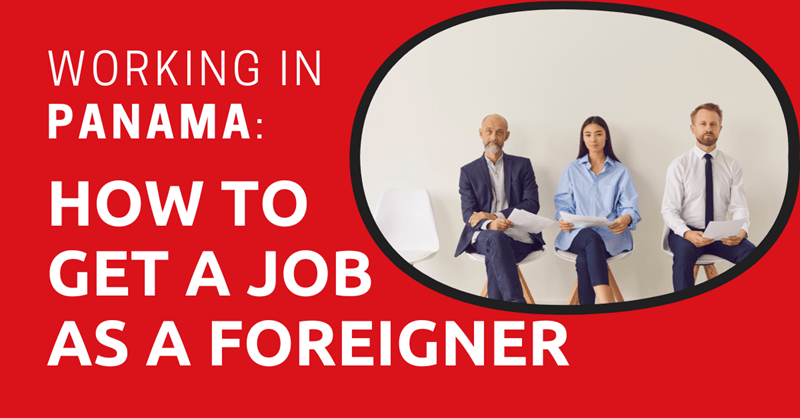
So, you want to work in Panama. Some aspect of the country has caught your attention, and now you want to reinvent your personal and professional life here.
You’re in good company: Tens of thousands of expats from around the globe have relocated to Panama in search of career opportunities.
Panama is the best option for foreign professionals seeking employment in Latin America. Often called the Hub of the Americas due to its international significance, this small Central American nation packs a strong punch. Its many characteristics appeal to working expats, including fast and stable internet, a network of multinational companies, and the highest salaries in the region.
While there is a wealth of employment possibilities in Panama, the truth is that it isn’t always easy to land a position here. For your job hunt to bear fruit, you’ll need to know the ins and outs of the Panamanian work environment.
I’ve been living and working in Panama since I moved here from the United States in 2021. In this article, I’ll share information and tips based on what I’ve learned as an expat in Panama City.
This article will take approximately 18 minutes to read. Don't have the time right now? No worries. You can email the ad-free version of the article to yourself and read it later!
Disclaimer: This article may include links to products or services offered by ExpatDen’s partners, which give us commissions when you click on them. Although this may influence how they appear in the text, we only recommend solutions that we would use in your situation. Read more in our Advertising Disclosure.
Contents
- The Job Market In Panama
- Popular Jobs for Expats
- Experience and Education Requirements
- Language Requirements
- Visa and Work Permit
- Where to Work in Panama
- Job Opportunities
- Restricted Jobs
- Expected Salary
- How Much Salary Do You Need to Live in Panama?
- Mastering Job Search Strategies
- The Hiring Process
- Understanding Panamanian Work Culture
- Commuting to Work
- Taking Time Off: Holidays, Vacations, And Sick Leaves
- Staying Tax-Compliant in Panama
- Now, on to You
The Job Market In Panama
Panama is one of the most economically stable countries in Latin America.
Its use of the U.S. dollar as the national currency has prevented the country from suffering the economic crises experienced by its neighbors. Panama is a high-benefit and low-risk destination for foreign professionals thanks to its outstanding living standards, low inflation rate, and rapid fiscal growth.
It’s generally easy for foreigners to land a job in Panama.
The country’s thriving economy and international outlook create a welcoming atmosphere for expats.
Some of the key factors that make Panama’s job market accessible to foreign employees are:
- Language Advantage: English is widely spoken in business and tourism circles, giving English-speaking expats an upper hand. Plus, many professional opportunities favor bilingual or English-speaking candidates.
- Global Connections: The presence of major international companies generates a constant demand for talented professionals from around the world.
- Government Support: The Panamanian government encourages foreign investment and participation in the workforce. Straightforward visa processes and programs designed to attract international professionals create a promising environment for expats seeking employment.
Popular Jobs for Expats
Expats usually find jobs in sectors that welcome international talent, including the following:
- International Business and Trade: Expats with experience in logistics, supply chain management, and trade find plenty of opportunities in this field due to Panama’s status as a global business hub and the presence of the Canal.
- Tourism and Hospitality: Panama’s tourism industry is booming, thanks to its fascinating cultural heritage and incredible biodiversity. Increased government funding to the tourism industry has created openings for expats in hospitality, tourism management, and related fields. International tourism professionals are in high demand at hotels, resorts, and tour companies.
- Finance and Banking: Panama’s financial sector has experienced significant growth in recent years, making it an attractive destination for foreign professionals with expertise in finance, investment, and banking.
- Multinational Companies: In the past couple of decades, major corporations have flocked to Panama to capitalize on its strategic location and stable economy. These companies hire expats for roles in management, marketing, technology, and more.
- Nonprofit Organizations: Expats can make a positive social impact by getting involved with the numerous nonprofit organizations in Panama – an excellent way to contribute to the community and make a difference.
Experience and Education Requirements
Looking at thousands of job listings, I’ve found that most open positions in Panama favor candidates with a high education level and considerable work experience.
Most entry-level jobs require an upper-level university degree (master’s or PhD) with at least two years of relevant experience. Certain positions allow candidates to substitute a bachelor’s degree plus significant experience, usually five years or more.
The probability of scoring a well-paying job increases with your education level and years of experience.
Don’t write off working in Panama just because you don’t have significant work experience. Many international organizations and companies provide internships, offering an excellent opportunity to boost your qualifications. This experience can be a gateway, potentially leading to a job offer after your internship.
Language Requirements
Panama has no formal language requirement to apply for residency or a work permit. However, you will need to speak professionally proficient Spanish to work here. Job postings list the specific language requirements for each position, but employers generally prefer candidates who are bilingual in English and Spanish.
Achieving professional proficiency means that you can hold meaningful workplace conversations in Spanish and communicate, orally and in writing, on topics relevant to your industry.
Visa and Work Permit
A residency visa and work permit are required for employment in Panama.
Panama has many temporary and permanent residency options available, and you should talk with a Panamanian lawyer to decide which is suitable for your situation.
Two popular visas for working expats are the Friendly Nations visa and the Professional Employment visa. The Pensionado visa – the residency pathway most retirees opt for – does not allow you to work in Panama.
National law requires you to hire an attorney to manage your visa and work permit application processes.
If you already have a job offer when you begin the residency application process, ask your employer to recommend a lawyer – many companies have relationships with immigration attorneys.
If your company can’t help you find an attorney, ask expats already living in Panama for recommendations. Avoid searching for a lawyer online or taking advice from someone who has not worked with the attorney in question. Unfortunately, there are many corrupt lawyers in Panama, and the best way to avoid being scammed is to choose an attorney based on personal testimonials.
Once you have obtained legal residency, you can apply for a work permit.
For a quick and trouble-free application process, find an employer willing to sponsor you and arrange your work permit. Their guidance and familiarity with local labor laws will save you time and money.
Where to Work in Panama
Panama has over 20 popular expat destinations and offers diverse lifestyles with its cosmopolitan capital city, coastlines along two oceans, highlands, and charming rural towns.
If you’re relocating to Panama as an employee within a company or organization – with no intention of freelancing or establishing your own business – settling in the capital is the logical choice. Panama City is a central regional business hub with career and salary opportunities you won’t find anywhere else in Panama.
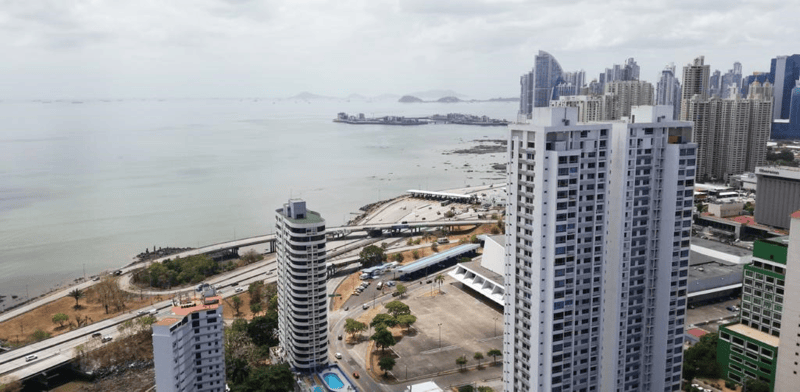
Beyond Panama City, the rest of the country is collectively called the interior.
Despite being rich in natural beauty and entrepreneurial potential, your options for employment are limited unless you’re interested in the tourism sector.
In that case, you might consider adding Boquete, a cool-climate highland destination with one of Central America’s largest expat communities, to your list.
Job Opportunities
There are still plenty of work opportunities for expats. Focus your job search on the following fields:
- Technology
- Sciences
- Sales
- Non-profit organizations
- Banking
- Construction
- Hospitality
- Embassies
- Shipping and logistics
- Teaching English
- Tourism
- Real estate
Please note that there is a fierce competition for open positions.
National law mandates that only 10% of each company’s workforce can be comprised of foreigners. This amount can be increased to 15% if a business needs a specific skill that isn’t widely available in Panama’s labor pool.
This exception usually applies to major international companies and organizations.
Panama is a global business hub, and multinational corporations like Maersk Line, Proctor & Gamble, Adidas, Nestle, Hyundai, and Dell Technologies have opened their regional headquarters in Panama City.
If you have a high-demand skill or expertise that’s rare in Panama, your chances of landing a job are higher.
Restricted Jobs
Two main hurdles can complicate your job hunt in Panama. The first is a policy known as profesiones reservadas, or careers reserved for Panamanian citizens.
Foreigners – including those with permanent residency – cannot work in the following professions in Panama:
- Law
- Medicine
- Nursing
- Dentistry
- Cosmetology
- Retail
- Social work
- Physical therapy
- Veterinary medicine
- Psychology
- Architecture
- All engineering disciplines.
There are many other protected careers; you can view the complete list here.
Expected Salary
It isn’t easy to pinpoint the average Panamanian salary because pay rates vary greatly and are influenced by education level, years of experience, industry, and region.
The standard minimum wage is about US$506 monthly (US$6,080 annually).
The median salary in Panama is US$2,161 monthly (US$25,940 annually). This middle-class salary buys a comfortable, but not luxurious, lifestyle for one or two people in the capital (which has the highest cost of living in the country).
It’s possible to earn a lot more, too – in fact, 25% of the Panamanian population takes home more than US$5,815 monthly (US$69,780 annually), a salary that affords an excellent quality of life anywhere in the country.
Multinational corporations and international non-profit organizations pay the highest salaries in Panama and commonly offer unique benefits to foreign employees, like housing and transportation stipends.
How Much Salary Do You Need to Live in Panama?
Generally, a comfortable but modest lifestyle for two people in a mid-income area of Panama City requires about US$2,000 monthly. In contrast, there are areas in the interior where a couple could live well on about US$1,000 monthly.
While the cost of living in the interior is considerably lower, so are the paychecks.
In Panama City, you’re likely to make over US$2,000 monthly, but you’d probably earn less than half that salary in the interior.
Mastering Job Search Strategies
Employment websites are valuable in your job search toolkit as they guide you through the application process without requiring your physical presence in Panama – you can apply from anywhere in the world.
International and local online job bulletins are widely used in Panama. LinkedIn and Glassdoor are helpful sites for identifying open positions at multinational companies and non-profits. Many job postings and application forms on these international sites are in English.
The Ciudad del Saber website lists roles at non-profit organizations like UNICEF, the World Food Programme, AID For AIDS, and multiple United Nations programs. Ciudad del Saber, meaning City of Knowledge, is a business and technology park home to dozens of companies that employ expat professionals.
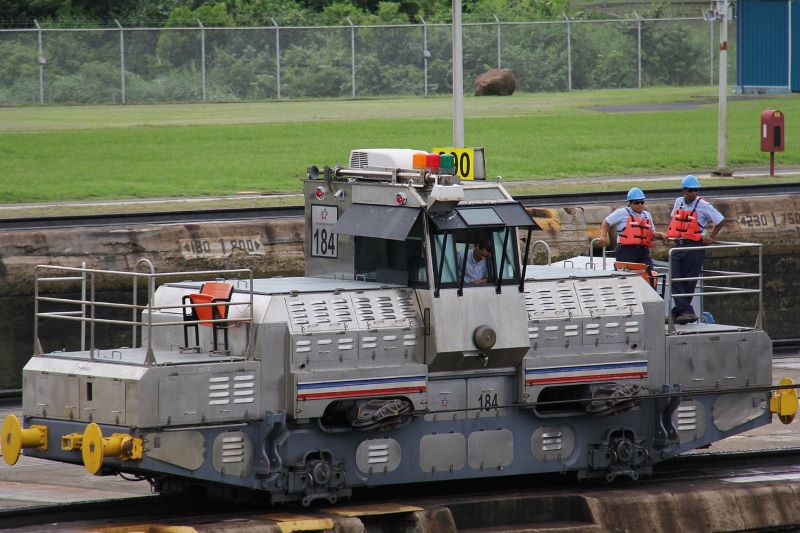
Two local online employment portals are Encuentra24 and Konzerta. You’ll need to know how to read and write Spanish to use either one of these sites, as all listings are in Spanish.
Panama has a “who-knows-who” approach to employment. The best step is to connect with people in the country as soon as possible. Network with other expats – you never know where a conversation might lead.
There are tens of thousands of English-speaking expats in Panama, and most are happy to help newcomers get the lay of the land. Joining an expat Facebook group offers the opportunity to network and ask questions about the work environment in Panama. The Expats In Panama and Young Expats In Panama Facebook communities are active, regularly organizing meet-ups and activities.
The Hiring Process
In Panama, most job application and hiring processes happen online, allowing you to easily manage the entire process from anywhere in the world.
It might take a while to hear back from potential employers, so don’t feel discouraged if you don’t get a reply in the first few days.
Application
To apply for open positions, use job portals and company websites. Ensure you include essential supporting materials with your application: a résumé or CV, a cover letter, and three professional references. Preparing a Spanish translation is a good idea if your documents are in English.
Initial Screening
If your application is shortlisted, the company’s HR department may call you for an initial screening, during which you’ll be asked to describe your qualifications and experience in greater detail. During the call, they commonly ask for a copy of your ID, such as a passport or driver’s license, and other necessary documents.
Interview
After the screening, you’ll be invited to an interview if you’re one of the top candidates. Since the pandemic, many Panamanian organizations have begun to conduct interviews online via Teams or Zoom, even for local candidates.
However, there are companies where in-person interviews are still the norm. If you’re outside Panama during your interview, inform your employer so they can accommodate you with a remote interview.
Skills Assessments
Once you’ve completed your interview, you could be asked to take skills assessments to measure your technical abilities, foreign language proficiency, or personal competencies.
These are usually done through an online portal.
References
At this point, the hiring committee will contact your references to learn more about your performance and work ethic.
Accepting the Job Offer
Next comes the job offer. The proposal will outline details of the position, including salary, benefits, and other terms of employment.
If you’re satisfied with the job offer, the final step is to sign the employment contract. Make sure you read the document thoroughly to understand your rights and responsibilities.
Dealing with Visa
Once the contract is in place, your employer will help you apply for your work permit if they have agreed to do so. If you need the company to sponsor you, tell them at the beginning of the job application process.
Understanding Panamanian Work Culture
Panamanian culture is warm and friendly, and engaging in personal conversations with acquaintances is culturally acceptable.
Don’t take offense if your coworkers ask about your family, background, or other personal aspects of your life; these questions are a natural part of getting to know someone in Latin America.
Personal Relationships
Trust and personal relationships are at the heart of Panama’s work environment. Your boss and colleagues will likely try to get to know you, and meetings often start with friendly chit-chat. Embrace the opportunity to connect with your coworkers personally – this helps you gain their trust and rapport.
If your boss or colleagues invite you to dinner or drinks, accept their offer.
Forming personal relationships at work will help you succeed within the company.
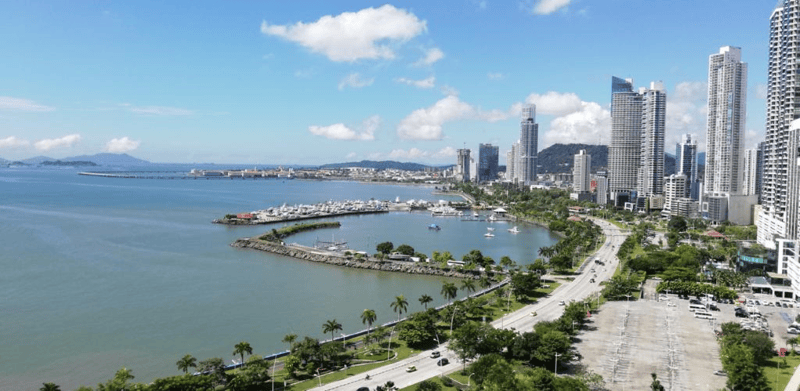
Relaxed Sense of Time
One aspect of Panamanian business culture that may surprise expats is its relaxed sense of time.
Unlike in time-conscious countries like the United States and Japan, punctuality is not as strictly enforced, and it’s typical for events and meetings to start later than planned.
Always do your best to arrive on time at work, but don’t stress if things don’t start right on the dot.
Use Professional Titles
Always be polite and formal when communicating with your superiors, and use their proper titles.
In Panamanian workplaces, it is common to use professional titles related to university degrees instead of señor or señora. The two most common titles you’ll come across are licenciado/licenciada for someone with a bachelor’s degree and doctor/doctora for someone with a doctorate.
Never address your superiors by their first name unless they’ve given you permission.
Dress Code
Panama is a Catholic country with traditional values. As such, you should dress conservatively at work – cover all tattoos, keep your hair a natural color, and remove any face or body piercings before heading into the office.
Tattoos and piercings are still taboo in many Panamanian companies, and if you have visible body modifications, they can lower your chances of getting hired.
Commuting to Work
Many people in Panama City travel to work by driving or using public transportation. Owning a vehicle is the most efficient way to get around the capital. However, traffic jams during rush hour can be tough to navigate; driving a few miles can take over an hour in these conditions.
Fortunately, Panama has a modern, clean, and safe metro system with trains to most areas of the city. With a fare of just 35 cents per ride, the metro offers an affordable, fast, and convenient option for commuting to and from work each day.
If you base yourself outside Panama City, you will certainly need a car to get to and from work. There is no public transportation system in the cities and towns of Panama’s interior, making daily life difficult without a private vehicle.
Taking Time Off: Holidays, Vacations, And Sick Leaves
Another benefit of working in Panama is that you will enjoy plenty of time off – up to 42 days a year!
The Panama labor code states that employers must give workers 30 days of paid vacation time for every 11 months worked. Some companies set vacations for a specific month, commonly December, while others let their employees choose when to take leave.
Employees in Panama are entitled to 18 days of paid sick leave per year, which the employer must cover at 100%. After the 21st day, Social Security covers sick pay at rates determined by national law. Social Security pays the worker’s leave from day one if the illness or injury is work-related.
Additionally, the Panamanian government recognizes 12 paid days of rest on holidays and national days of mourning. If such a date falls on a Sunday, the following Monday is declared a day off. Panama’s 12 days of rest are the following:
- Jan. 1 – New Year’s Day
- Jan. 9 – Martyrs’ Day
- February/March – Carnival Tuesday
- March/April – Good Friday
- May 1 – Labor Day
- Nov. 3 – Day of Separation from Colombia
- Nov. 4 – Day of National Symbols
- Nov. 5 – Colón Day
- Nov. 10 – First Cry of Independence from Spain
- Nov. 28 – Independence Day
- Dec. 8 – Mother’s Day
- Dec. 25 – Christmas Day
The Panamanian workweek consists of 48 hours, running from Monday to Saturday at noon. The workday spans nine hours from Monday to Friday, including a one-hour lunch break. Usually, work occurs between the hours of 6 a.m. and 6 p.m.
Staying Tax-Compliant in Panama
Panama only taxes locally earned income, meaning you will only owe tax on profits from Panamanian sources. If you live in Panama but generate profits from international entities, the Panamanian government will not tax you.
Income tax in Panama is charged on a sliding scale from 0% to 25%. The initial US$11,000 of yearly income is tax-exempt. A 15% tax rate applies to income between US$11,001 and US$50,000, while any amount exceeding US$50,000 is subject to a 25% tax.
This does not mean your entire income will face a 25% tax rate if it exceeds US$50,000 a year. Instead, each tax percentage is applied only to the corresponding income bracket.
Panamanian law requires employees to contribute two additional taxes deducted from their monthly paychecks. The Social Security tax – usually 9.75% of an individual’s monthly salary – supports the public healthcare system, pensions, and disability coverage.
Additionally, a 2% education and culture tax funds educational and cultural programs in Panama.
Now, on to You
Panama attracts professionals from around the world with its diverse business landscape, high standard of living, warm climate, and relaxed atmosphere.
Though looking for work in a foreign country can seem daunting, there are promising employment opportunities for expats in the Hub of the Americas.
With determination, research, planning, and the right connections, you can build a rewarding career in Panama.




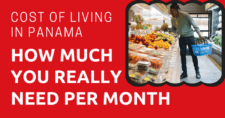
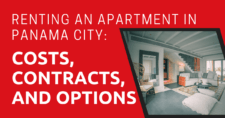
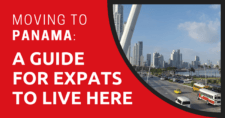

From what i have read i think is a niece place to stay and work.
Yes, Panama is a definitely a nice country to live and work.